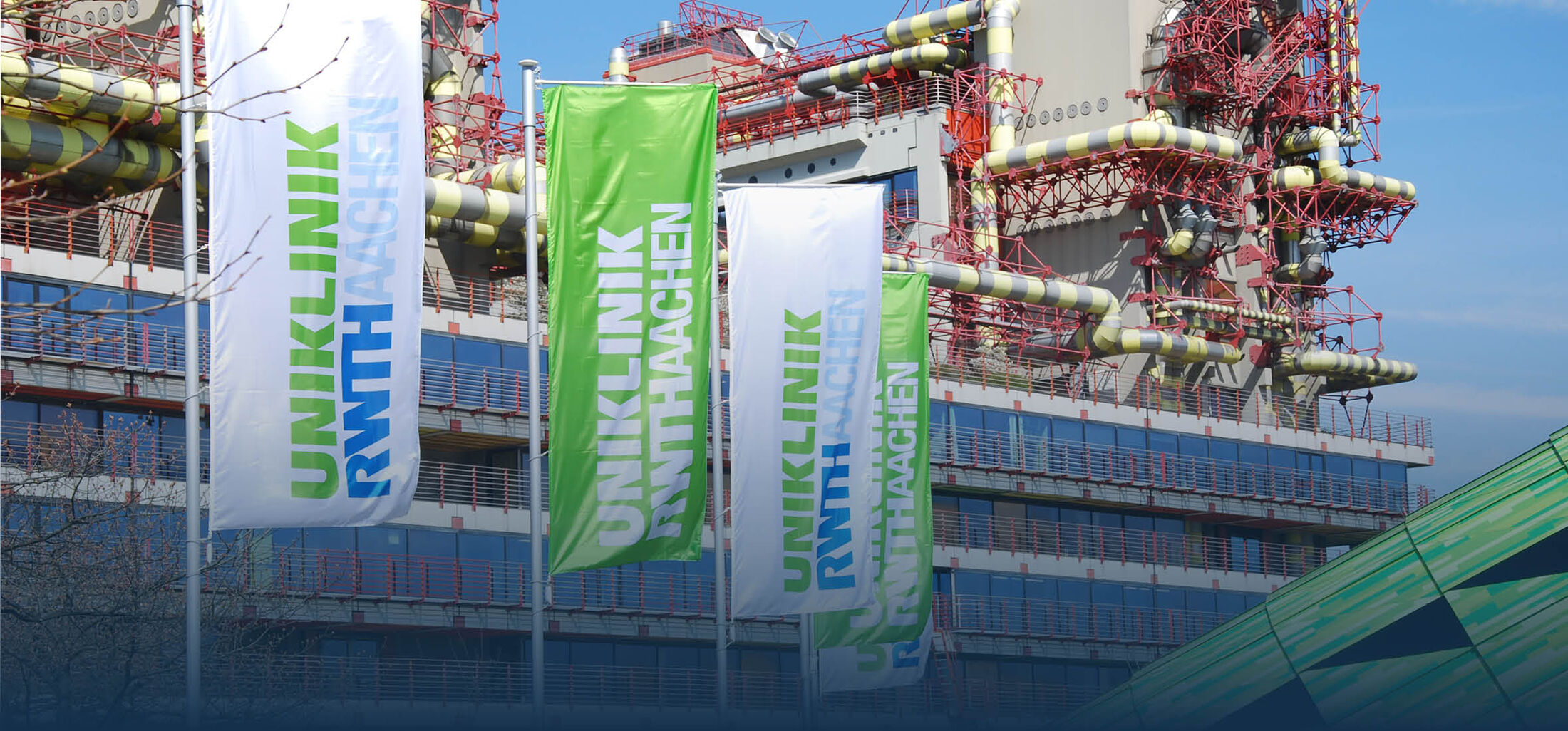- Bioactive Adrenomedullin (bio-ADM) is an established biomarker for the real-time assessment of endothelial function in critical care settings
- Endothelial dysfunction plays a central role in the pathophysiology of COVID-19
- Data from the German University Hospital RWTH Aachen show that endothelial function biomarker bio-ADM can support the management of COVID-19 patients
- Elevated bio-ADM levels indicate disease severity and predict the need for extracorporeal organ assist in COVID-19 patients
- SphingoTec has made available to the critical care community a rapid point of care test for measuring bio-ADM levels at the point of need
Aachen, Germany and Hennigsdorf/Berlin, Germany, April 29, 2021 – German University Hospital Uniklinik RWTH Aachen (“Uniklinik RWTH Aachen”) and diagnostics company SphingoTec GmbH (“sphingotec”) today announced that the endothelial function biomarker bio-ADM aids in the early risk stratification and management of patients suffering from severe COVID-19, in need for escalated intensive care treatment (1). A team lead by the clinical researchers at Uniklinik RWTH Aachen has shown that high bio-ADM levels indicate the severity of the acute respiratory distress syndrome (ARDS), the subsequent need for organ support, and poor outcomes in severely ill COVID-19 patients. Bioactive Adrenomedullin (bio-ADM) is a hormone regulating endothelial function and has been previously validated in over 35.000 patients with diseases where endothelial dysfunction plays a key role, such as sepsis, septic shock, cardiogenic shock, and acute heart failure.
According to the recently published data (1), high bio-ADM levels predict a severe course of COVID-19 infection at admission and identify patients with deteriorating lung function at high risk to develop severe ARDS. Furthermore, the data demonstrate that high bio-ADM levels identify those patients in need of extracorporeal organ assist, such as mechanical ventilation, veno-venous extracorporeal membrane oxygenation (ECMO), renal replacement therapy (RRT).
Prof. Gernot Marx, (Director of the Department of Operative Intensive Care Medicine and Intermediate Care at Uniklinik RWTH Aachen) commented, “In the management of COVID-19 patients there is a high need for early risk stratification biomarkers that allows us to allocate resources and timely plan for therapy escalation. Endothelial dysfunction is a central mechanism in the pathophysiology of many critical care conditions, including COVID-19. The information provided by the bio-ADM measurements has convinced us to include it in our clinical routine measurements. “
These findings confirm and extend previous studies in critical care patients where bio-ADM indicates severe complications in sepsis (2,3), acute heart failure (4), and cardiogenic shock (5). High bio-ADM levels indicate severe hypotension, edema formation, ionotropic/vasopressor use, need for organ support, such as mechanical ventilation, and subsequent organ failure. Being a dynamic biomarker, low or decreasing bio-ADM blood levels indicate improved outcomes (3).
Dr. Andreas Bergmann, CEO and founder of SphingoTec, said, “By monitoring the endothelial dysfunction early in COVID-19 patients, clinicians can timely identify those patients with an unfavorable disease progression. To further support the management of critically ill patients, we have made available the assay for bioactive Adrenomedullin as a rapid near-patient test.”
The CE marked point of care assay for measuring bio-ADM levels is commercialized under the brand name IB10 sphingotest® bio-ADM®. The rapid test runs on SphingoTec`s automated Nexus IB10 point-of-care platform and quantitatively measures levels of bio-ADM directly in blood samples and delivers results after 20 minutes.
References
(1) Simon T-P et al. Prognostic Value of Bioactive Adrenomedullin in Critically Ill Patients with COVID-19 in Germany: An Observational Cohort Study. Journal of Clinical Medicine. 2021, 10, 1667. doi.org/10.3390/jcm10081667
(2) Mebazaa A et al. Circulating adrenomedullin estimates survival and reversibility of organ failure in sepsis: the prospective observational multinational Adrenomedullin and Outcome in Sepsis and Septic Shock-1 (AdrenOSS-1) study. Critical care. Dec 21 2018;22(1):354.
(3) Caironi P et al. Circulating Biologically Active Adrenomedullin (bio-ADM) Predicts Hemodynamic Support Requirement and Mortality During Sepsis. Chest. Aug 2017;152(2):312-320.
(4) Ter Maaten JM et al. Bio-adrenomedullin as a marker of congestion in patients with new-onset and worsening heart failure. European journal of heart failure. Jun 2019;21(6):732-743.
(5) Tolppanen H et al. Adrenomedullin: a marker of impaired hemodynamics, organ dysfunction, and poor prognosis in cardiogenic shock. Annals of intensive care. Dec 2017;7(1):6.
Uniklinik RWTH Aachen
The Uniklinik RWTH Aachen is a supramaximal care provider that combines patient-oriented medicine and nursing, teaching and research at an international level. With 36 specialist clinics, 28 institutes and five interdisciplinary units, the University Hospital covers the entire medical spectrum. Excellently qualified teams of doctors, nurses and scientists are competently committed to the health of the patients. The bundling of patient care, research and teaching in one central building offers the best conditions for intensive interdisciplinary exchange and close clinical and scientific networking. Around 8.000 employees provide patient-oriented medicine and care according to recognized quality standards. With 1.400 beds, the University Hospital treats around 50.000 inpatient and 200.000 outpatient cases per year.
About SphingoTec
SphingoTec GmbH ("SphingoTec"; Hennigsdorf near Berlin, Germany) develops and markets innovative in vitro diagnostic (IVD) tests for novel and proprietary biomarkers for the diagnosis, prediction and monitoring of acute medical conditions. SphingoTec's proprietary biomarker portfolio includes bioactive Adrenomedullin (bio-ADM), a unique biomarker for real-time assessment of endothelial function in conditions like sepsis or congestive heart failure, Proenkephalin (penKid), a unique biomarker for real-time assessment of kidney function, and Dipeptidyl Peptidase 3 (DPP3), a unique biomarker for cardiac depression. IVD tests for SphingoTec’s proprietary biomarkers are made available as sphingotest® microtiter plate tests as well as point-of-care tests on the Nexus IB10 immunoassay platform.SphingoTec’s subsidiary Nexus Dx Inc. (San Diego, CA, USA) produces the tests alongside a broad menu of established and commonly used tests for acute and critical care.
About bio-ADM®
IB10 sphingotest® bio-ADM® is a rapid point-of-care (POC) immunoassay for the in vitro quantitative determination of bioactive Adrenomedullin (bio-ADM), a hormone maintaining endothelial function. The endothelium contributes to blood pressure and separates blood from the surrounding tissue. Elevated blood levels of bio-ADM predict blood pressure break down and leaky vessels resulting in oedema. Imbalanced endothelial function is the major cause of shock ultimately resulting in organ dysfunction and death. Early identification of an imbalance in endothelial function allows guidance of vasopressor and diuretic therapy in critically ill patients to improve outcomes.
Press contact
Dr. Mathias Brandstädter
Leitung Unternehmenskommunikation
Uniklinik RWTH Aachen
Pauwelsstraße 30
52074 Aachen
Telefon: 0241 80-89893
www.ukaachen.de
Ruxandra Lenz
Sr. Manager Marketing and Communications
SphingoTec GmbH
Neuendorfstr. 15 A
16761 Hennigsdorf
Germany
Tel. +49-3302-20565-0
presssphingotecde
www.sphingotec.com




